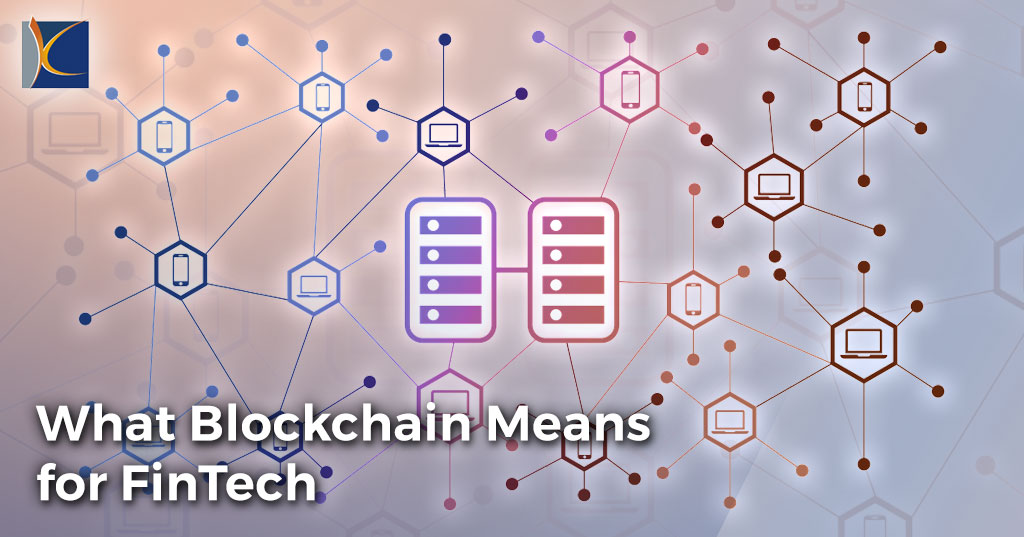
what-blockchain-means-for-fintech
What Blockchain Means for FinTech
Posted on October 16, 2018 in Uncategorized
Blockchain technology is essentially a new way of storing data through decentralized ledgers. Instead of relying on a third party record holder, every party to a blockchain has an instantly updated copy of the ledger. Data integrity is maintained because it’s virtually impossible to alter the data on all existing ledgers. While the implications of that are far and wide reaching, the most apparent and immediate use cases have come to FinTech.
FinTech, or financial technology, is a relatively new industry that applies advances in technology to further access to the financial industry. Innovations like mobile banking and investment apps are some of the more visible uses of FinTech.
The most notable disruption has been from cryptocurrencies like bitcoin and ethereum, in part due to their meteoric rise in value and subsequent market volatility. Such a new phenomenon has thrilled investors, financial pundits and even caught the attention of those not actively involved in the finance industry.
Whether you’re short or long on cryptocurrencies, the truth is that they are a pretty small part of the potential that blockchain has to foundationally change and create new systems in FinTech. Here are four other ways that blockchain will change the way we do business.
Tokenization of Assets
Tokenizing assets refers to replacing trusted intermediaries and paper certificates with digital proof of ownership. This can be ownership of anything, but is being used more and more to bring liquidity to otherwise illiquid assets like real estate and art.
Once an asset is tokenized, it can be divided and sold in smaller pieces allowing partial ownership of regulated securities. This also provides an entirely new way to offer investment into startup companies or any organization looking to go public and raise funds.
Digitizing access to an investment market also expands the potential pool of investors from those with the required resources to nearly anyone around the world with access to the Internet. Tokenizing assets creates scalability previously unheard of in traditional financial markets.
Verification of Accounts and Identity
As much as FinTech is speeding up the digital transformation of the finance world, some aspects still require the use of traditional paper and certificates. For example, it’s easy to transfer money online, but before withdrawal can occur, verification of ID is usually required — and that almost always means something analog like uploading a picture of a driver’s license or passport.
Because a well designed blockchain is immutable in its data, it creates a more secure environment to automate trust. Though the basis for ID may originate from an analog source, once entered into a blockchain, the provenance is instantly trackable which in effect guarantees identity with confidence and speed.
Easy Access for Regulators
Establishing compliance with federal requirements is a complex task that usually requires a dedicated staff to ensure all the necessary documents are in place. Whether it’s documenting new hires or community investment, there’s a lot of room for error in the huge swaths of paperwork.
With blockchain technology, it’s possible to write a program that automatically captures and inputs necessary data into the distributed ledger. Federal regulators can access that data and ensure compliance through the highly secure and unalterable blockchain. Not only does this make compliance easier, it greatly reduces the costs associated.
Smart Contracts
Smart contracts aren’t actually contracts — and they’re not even smart. They’re simply pieces of code written to automatically perform transactions once the terms of the agreement have been met. For example, if two parties were performing a transaction, a smart contract would transfer digital ownership to the new party once it determines that payment has been made in full.
Traditionally this has been a resource and cost intensive process. Assuring that all aspects of the agreement have been met once required lawyers and tied up cash flow. Smart contracts automate the process, reduce cash-flow cycles dramatically and eliminate the need for escrow services and contract verification. This brings down costs and frees up cash for growth — not contract disputes and arbitration.











